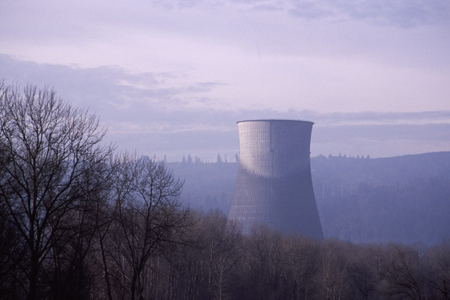
Nuclear reactor technology has allowed the world-wide use of nuclear reactors for energy production. With the world faced with mounting carbon dioxide levels and global warming a concern, nuclear energy provides a low carbon emission alternative to traditional energy sources (World Nuclear Association and MIT study). This aspect of nuclear energy makes it a very attractive energy alternative. With President Obama wishing to expand the United States nuclear power plant program, the question becomes an issue of balance-of-risks.Accelerating nuclear reactor development provides a low carbon emission energy source; however there is risk associated with the use of nuclear materials. If we do not take advantage of nuclear’s low carbon footprint and instead pursue other, higher carbon footprint strategies, we risk exacerbating global warming issues. There are other options, as well, such as cleaner technologies, emerging energy technologies and reducing fertility rates to decrease population size.We seek to understand the low probability, high impact, long-tail risks associated with the use of nuclear materials. Since the dawning of the nuclear age, mankind has worked to harness the power of the atom. There have been many benefits from the use of radionuclides. However, there are risks as well.Risk areas to consider in looking at nuclear energy include:- Economic, including Externalities
- Design and Construction
- Natural Disasters
- Operations and Management
- Political and Regulatory
- Terrorism, War and Sabotage
- Radioactive Waste Treatment and Storage
We have had experience with nuclear accidents that display some of that high impact, long-tail risk. Previous blog articles have discussed Chernobyl, Three Mile Island and Fukushima (3/12/11, 3/25/11 and 3/28/11).We have seen historical flooding on the Missouri River which threatened Fort Calhoun Nuclear Plant and Cooper Nuclear Plant in Nebraska. Recently we have seen the large Las Conchas Wildfire threaten the Los Alamos Energy Department facility in New Mexico. These situations, including those situations where facilities were threatened but not breached, are all reminders that radiation is a serious risk and not simply an abstract probability.
We look up into the night sky, especially in some spot far away from city lights, and see the moon and stars. The ancients found faces in the moon and named loose collections of stars for things they could identify with, and used them as symbolic tokens and for navigation. Thus we have constellations named “Capricorn” and “Virgo” and archers and bears gracing the night sky. For many the stars assemble themselves in easily fed advice, stating things such as “feed your mind today“ or “today is a good time to chill out”. For others, the moon and stars represent a dream of future exploration, an accumulation of human knowledge, and mapping out human destiny.There are some that look at the cost of space exploration and turn aside, thinking it too expensive, not worthy of pursuit. To these individuals, all they see is the need that currently exists on earth, and thus the opportunity cost of space exploration is expressed in terms of what could otherwise be done with the money spent on space exploration. Understanding their concern is easy, considering the extent of earth’s problems, however such individuals don’t appreciate the considerable societal benefits that space exploration confers.Many technological advances that have occurred in the framework of the space program went on to fuel major technological achievements in the public and private sectors These advances have brought forth new industries, and have fueled overall job creation via the multiplier effect in the general economy, generating a significant economic gain and better standard of living.NASA’s Space Shuttle Discovery is currently flying on it’s last mission. Discovery has completed more than 30 successful missions since its first flight on August 30, 1984. It has performed both assembly missions for the International Space Station (ISS) and research missions. Discovery takes its name from a long line of historical vessels that have ventured forth to explore and discover, including Henry Hudson’s Discovery, used to explore Hudson Bay in 1610-11 in an attempt to find the Northwest Passage. The Space Shuttle Discovery has been emblematic of the quest to explore and discover new territories and new meanings. NASA Television can be viewed to get an idea of activity on the Space Shuttle.

At the New Year 2011 we wait for the next chapter in the continuing saga that is Wikileaks. A look at news articles under “Wikileaks” displays the many concepts that Wikileaks has touched.In my view, the most profound concept to come from the Wikileaks saga is how we define categories and how that categorization reflects changing technology. We form mental categories, assigning meaning to events based on our experiences and the internal representations of those experiences. The richness of life reflects how these categories vary between people, places, events.Society organizes around these categories with laws and social norms. Concepts thread their way from the dawn of time to the present, providing a beacon around which to organize.Over time, these structures have been built around differing sets of risks and rewards as technology and social norms have evolved. As we inherently consider risks and rewards in our decision making, the fact that risks (and rewards) have changed so much with advancing technology means that structures and concepts will be reexamined to reflect those changes. The ability for small changes to leverage themselves so quickly over such a wide area provides opportunity for considerable rewards but at the same presents considerable risks. It is incumbent upon us as a society to examine both elements, risk and reward and to reflect how we categorize the many things that impact our life. These are issues society must decide as it moves forward.

